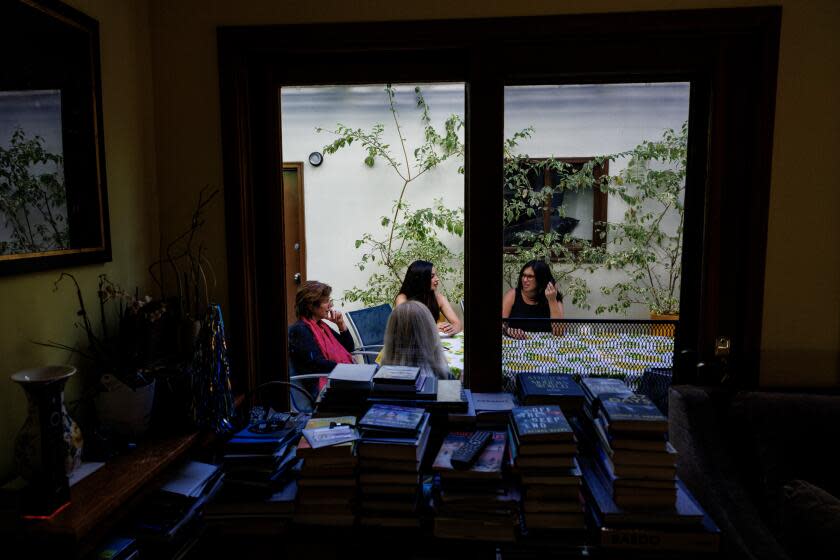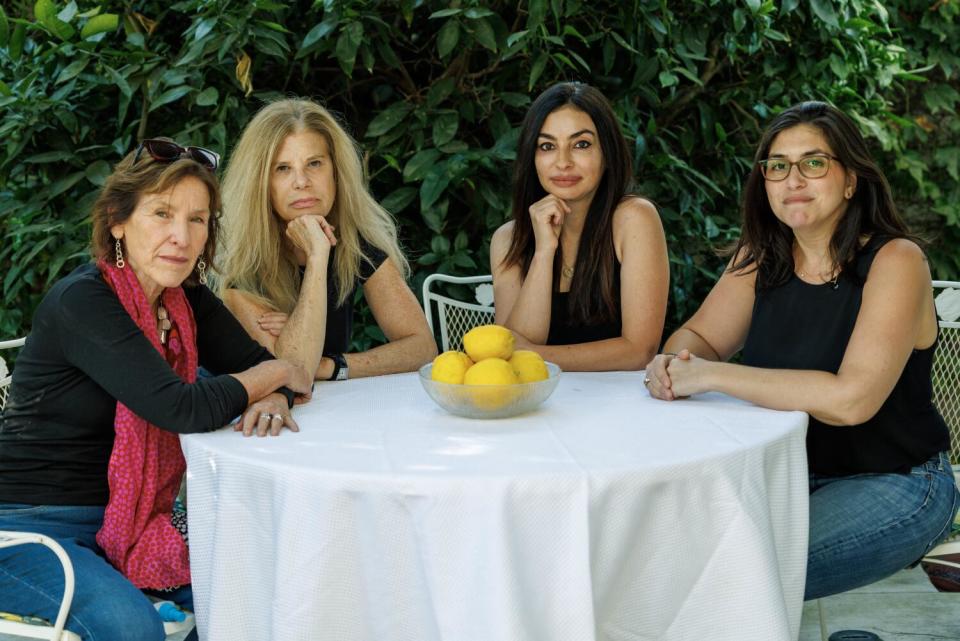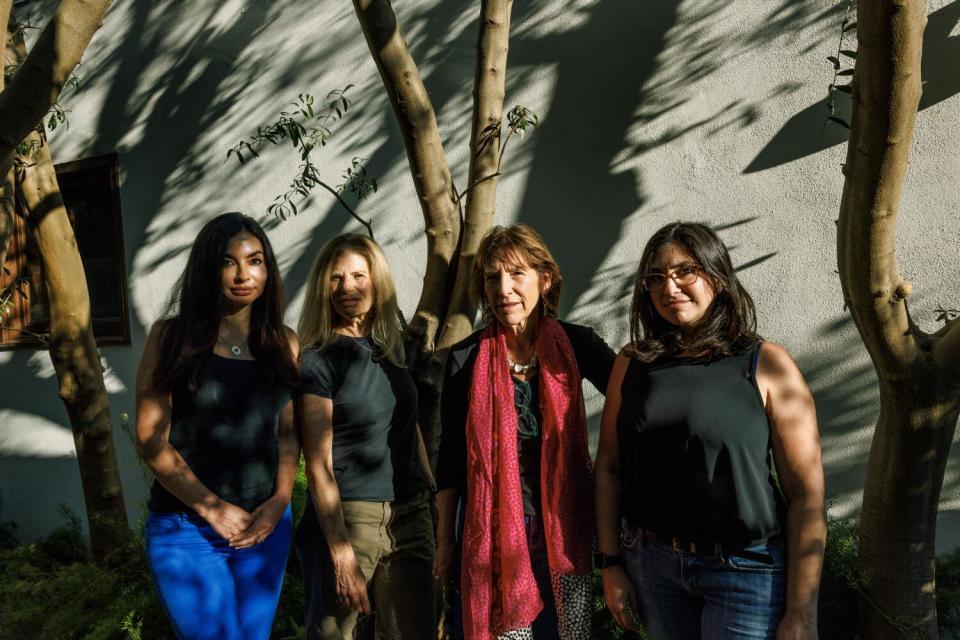How Beverly Hills became an unlikely battleground for the future of abortion rights

Emma Craig was outside the Beverly Hills Medical Center on Wilshire Boulevard, spoiling for a fight.
Armed with a bullhorn, sidewalk chalk and "giant photos of dead babies," the Bay Area art teacher and antiabortion activist had arrived with her confederates last summer to pray and protest against a clinic seeking to expand its services to California amid a flurry of national restrictions on reproductive care.
Construction on the DuPont Clinic, a highly specialized abortion provider based in Washington, D.C., had halted weeks earlier. But members of Survivors of the Abortion Holocaust — who received confirmation of the development from Beverly Hills officials, emails show — decided to keep protesting anyway.
The Survivors, as they call themselves, were geared up for weeks of aggressive street outreach, in-your-face pickets and guerrilla freeway banner drops. Their Beverly Hills campaign would offer a playbook on future efforts to shut down a clinic even in the nation's cities and states that most support abortion rights.
"We wanted to demonstrate to the building management and to the city, if this clinic goes in here, it’s not going to be good," Craig said. "You’re gonna have protesters in your beautiful town with these terrible giant photos."
Almost as soon as they were approached, public records show that Beverly Hills officials moved swiftly to address the concerns of a group considered extremist even within California's antiabortion movement — "the redheaded stepchild," as Craig put it.
Reproductive-rights advocates allege Beverly Hills officials met with Craig's group and allied activists and aggressively pursued their concerns, while entreaties to meet with DuPont's leadership went unanswered for months.
The Times reviewed emails obtained by the reproductive-rights groups the Lawyering Project and Beverly Hills for Choice that show one city leader responding to an inquiry about efforts to shut down the clinic within five minutes of receiving it.
"I am looping our City Manager and City Attorney into this email," current Vice Mayor Sharona R. Nazarian wrote to antiabortion activist Tasha Barker. "I am not sure what jurisdiction we as a Council have on a private business entering the City of Beverly Hills but opened to learning more."
Less than a month after Barker first met with city officials, landlord firm Douglas Emmett moved to terminate DuPont's lease, ordering management to halt construction on the clinic.
The firm's attorney cc'd the mayor and the city manager of Beverly Hills on the message.
It cited the Survivors' early activism as central to the decision, saying: "These graphic threats have already disturbed and caused interference with other tenants' use and enjoyment of their leased premises."
The group's activities in Beverly Hills are the subject of ongoing litigation by the clinic against the landlord and the city's government.
Attorneys for Douglas Emmett did not respond to requests for comment.
For the Survivors, the outcome was a coup. For DuPont and abortion-access advocates, it was a dangerous new front in the war on reproductive rights.
Andrea Grossman, one of the founders of Beverly Hills for Choice, said of the city's leaders: "They couldn't meet with these extremists fast enough."

"All it took was about five antiabortion extremists to exert pressure on members of the city council and members of city staff, and before you know it, the lease was rescinded," she said. "It's a stain on the city that it meddled with something so urgent as this."
Dr. Jennefer Russo, the DuPont Clinic's chief medical officer, said she requested to meet with Beverly Hills officials but was rebuffed. The mayor of West Hollywood and a Corona city councilwoman also reached out to their Beverly Hills counterparts on behalf of DuPont, email records show, but to no avail.
"I reached out a number of times before things started escalating," Russo said.
The city denied allegations it had helped scuttle the clinic.
"The decision to rescind DuPont Clinic’s lease was not made by the City of Beverly Hills," public information manager Lauren Santillana wrote in a statement in response to DuPont's lawsuit against the city.
But the widespread impression that officials thumbed the scale against DuPont — in spite of the state's "abortion sanctuary" status, the county's $20-million "abortion safe haven" grant fund and the city's public position in support of reproductive freedom — has emboldened extremists.
"This is the first time that a supposedly supportive city has done this," Russo said. "Survivors is saying, 'We triumphed,' and now it's a win for them."
The Survivors agreed.
"We were encouraged that activism works," Craig said. "We loved working in Beverly Hills."
A medical miracle and a legal gray area
Politically speaking, Beverly Hills is a violet island in a sea of deep indigo. Although Republican candidates routinely raise millions there, they tend to garner just a few thousand votes.
On reproductive rights, the city is slightly more progressive than the county as a whole. In 2022, Beverly Hills and its neighbors in the 36th Congressional District voted almost 80% in favor of Proposition 1, helping enshrine abortion access in California's Constitution.
DuPont would not have been the only abortion provider in Beverly Hills. It would not even have been the only abortion provider at 8920 Wilshire Blvd., where the clinic was set to open last fall.
But it would have been the only clinic in Southern California offering procedures after 24 weeks, which account for a small fraction of a percent of the 1 million abortions performed nationwide in 2023.
Devastating fetal diagnoses, life-threatening maternal complications or pregnancy among very young patients or in the aftermath of abuse are the most common circumstances surrounding such late-term abortions, according to Dr. Kim Bader, associate professor emeritus of obstetrics and gynecology at USC Keck School of Medicine.
"My experience with patients who needed late-term abortion were nightmares, absolute nightmares," said Bader, who spoke in support of the DuPont clinic at the Beverly Hills City Council meeting in November. "I get choked up just thinking about it."
Care for such patients is extremely difficult to obtain, in part due to medical and legal restrictions, along with the social stigma. The cost can balloon to $10,000 or more, while waits can stretch close to a month.
"As you get later, it can become a three-day procedure," Russo, the DuPont doctor, explained. "It’s sort of like an induction of labor the third day. That can take several hours, and it’s a very intensive process."
Abortion later in pregnancy is very different from first-trimester procedures, which account for 93% of the total and are now mostly induced at home with medication, according to the federal Centers for Disease Control and Prevention.
Later-stage abortions are also meaningfully different from the 6% that occur between 14 and 20 weeks, usually via "dilation and evacuation," a two-part procedure.
Twenty weeks is the point at which most first-time mothers can sense fetal movements, or quickening. It is also the dividing line between miscarriage and stillbirth.
Just 1% of abortions are performed after this point, nearly all of them between 21 and 24 weeks. Most happen in hospitals such as Cedars-Sinai, about a mile from the Beverly Hills Medical Center.
Survival at or before 24 weeks gestation is a medical miracle, one frequently touted by hospital PR and picked up by local TV stations. Yet because at least half of infants born by 24 weeks can survive, that is popularly understood as the cutoff for "fetal viability" — a legal standard established under Roe vs. Wade and refined under Planned Parenthood vs. Casey as the point where abortion could be banned by the states.
Forty-three percent of Americans say abortion should be illegal at this point, according to a 2022 Pew Survey.
But the medical picture is more complicated, many experts argue.
"There’s no medical reason to ban abortion based on how far along someone is in pregnancy," said Brittany Fonteno, president of the National Abortion Federation. "This is something that’s been created solely by antiabortion advocates and politicians to chip away at reproductive rights."

Many abortion-protective states — among them Massachusetts, New York and Nevada — ban the procedure at or past 24 weeks. Nine others, plus the District of Columbia, have no gestational restrictions.
California law falls somewhere in the middle, banning abortion after "viability" without specifying a gestational age.
This ambiguity left DuPont vulnerable to claims it planned to violate the law — as the Survivors have repeatedly alleged and the clinic has denied.
"We were 100% going to be compliant … but the law isn’t clear," Russo said.
For the Survivors, this laser focus on a tiny percentage of procedures — roughly 1,000 a year in the U.S. — is less about the law than about optics.
"It’s particularly barbaric, and we think this is an 'in' to get people to care about abortion," Craig said. "It's kind of strategic."
'We gotta do something about this'
As fundamentalist Christians, the Survivors believe life begins at fertilization, and that a 24-hour-old zygote is as alive as a 24-week fetus.
But the activists know few Californians share that view. In a city where fertility clinics outnumber churches, fewer still would be willing to legislate it.
The Beverly Hills Medical Center "already has an abortion clinic in it, so we know they’re OK with abortion," Craig said.
Emails show the activists received confirmation from Beverly Hills police, city government and the building manager that DuPont's lease was rescinded, yet continued to publicly claim it was expected to open for more than two weeks afterward.
When local activists discovered what had happened, it was faith, as much as politics, that pushed them to fight back.
Grossman, of Beverly Hills for Choice, had never heard of DuPont or the Survivors of the Abortion Holocaust when she spotted a story about the clinic in The Times last August. Though she'd long been a staunch supporter of reproductive rights, the issue had felt far away, a crisis for other women in other communities, not a liberal urban enclave known internationally as a destination for world-class medical care.
She immediately called her friend Gay Abrams.

"I said we gotta do something about this," said Abrams, who raised the alarm to her neighbor Heather Fels when they bumped into each other on the street a few days later.
From there, the trio began contacting political organizations around Los Angeles, which led them to Amanda Smith. They nicknamed themselves the "abortion yentas," borrowing the Yiddish word for a busybody or gossip.
For the yentas, the Survivors' name alone is offensive. And they found the antiabortion activists' decision to flood the City Council's public comment period on Yom HaShoah, the Jewish day of mourning for victims of the Nazi genocide, especially galling.
But what troubled them most was that a small cadre of fundamentalist Christians had managed to impose their will on one of few municipalities in the United States where Christians are not the majority.
About a quarter of Beverly Hills residents are estimated to be Jewish refugees from Iran and their descendants, while Jews like the yentas with roots in Eastern Europe make up a plurality of the remaining population.
They made their initial foray into activism at the City Council meeting last September. But Smith said they were stonewalled until Thanksgiving.
They teamed up with the Lawyering Project, a Brooklyn-based nonprofit focused on abortion access, and filed a request under the California Public Records Act that yielded 1,200 pages of city emails.
Since then, the group has pushed aggressively for an independent investigation into the affair, concurrent with a DuPont lawsuit against the city alleging it "colluded and conspired" with the landlord to "induce breach of contract." The clinic has also filed a claim against Douglas Emmett.
Both the city and the landlord have denied any wrongdoing in court filings, and the cases remain pending.
"We want accountability," Grossman said. "We’re not gonna go away and shut up, because how do four yentas shut up?"
'There have to be consequences'
The yentas call their quest a form of tikkun olam, the Jewish spiritual practice of repairing the world.
The Survivors call it a tantrum.
"All these pro-choice women showed up to the City Council, and they’re really angry now — but you snooze you lose," Craig said.
Yet she too is keenly aware that the lawsuit could rewrite the rules of engagement just as they'd seemed to tilt in the activists' favor.
"What's unfortunate about these pro-choice activists getting stirred up is, when this happens again in a different community, the city’s gonna look at what happened with DuPont and say, 'We don’t want to deal with lawsuits,'" Craig said.
That's exactly what the clinic's medical director is hoping for.
"It can’t be a precedent — there have to be consequences," Russo said. "If we’re not going to be able to provide care, we have to make it possible for others to provide it."
If there's one thing both sides agree on, it's that the stakes are existential.
"If you could push a clinic like this out of Beverly Hills," Bader said, "you could push it out of anywhere."
This story originally appeared in Los Angeles Times.


